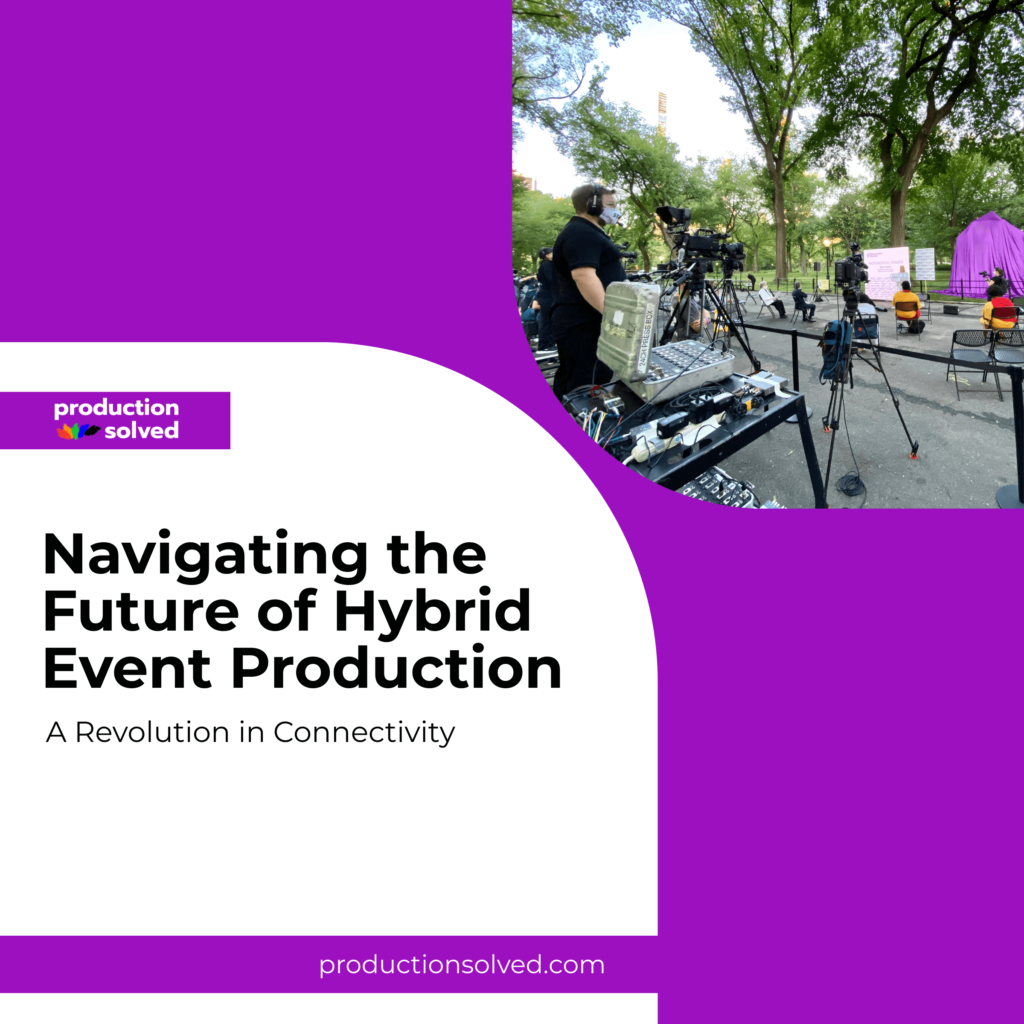The world of events has undergone a seismic shift in recent years, with the advent of hybrid event production. What started as a response to the challenges posed by the COVID-19 pandemic has now evolved into a full-fledged revolution in the event industry. As we move forward into a post-pandemic world, hybrid events are poised to become the new norm, reshaping the way we connect, collaborate, and engage. In this article, we will explore the future of hybrid event production, delving into the technology, trends, and strategies that will drive this transformation.
The Rise of Hybrid Events
Before we delve into the future, let’s briefly touch on the rise of hybrid events. Hybrid events represent a fusion of in-person and virtual experiences, allowing attendees to participate from anywhere in the world. They offer unparalleled flexibility, accessibility, and scalability. As the world grappled with the pandemic, hybrid events became a lifeline for the event industry, enabling it to adapt and survive.
However, the success of hybrid events during the pandemic was not merely a stopgap measure. It marked the beginning of a new era in event production. The lessons learned from these challenging times have paved the way for a future where hybrid events will continue to thrive and evolve.
Technology: The Backbone of Hybrid Events
At the heart of the future of hybrid event production lies technology. Advancements in technology have played a pivotal role in making hybrid events not only possible but also highly engaging and immersive. Here are some key technological trends that will shape the future of hybrid event production:
- 5G Connectivity: The rollout of 5G networks will significantly enhance the streaming quality and overall experience for virtual attendees. High-speed, low-latency connectivity will enable seamless video conferencing, live streaming, and interaction.
- Virtual Reality (VR) and Augmented Reality (AR): VR and AR technologies will bridge the gap between physical and virtual attendees. Imagine a virtual attendee putting on a VR headset and feeling like they are in the same room as the physical attendees. This level of immersion will revolutionize the hybrid event experience.
- Artificial Intelligence (AI): AI-powered chatbots and virtual assistants will be a common presence at hybrid events. They will provide real-time support, answer questions, and facilitate networking among attendees.
- Interactive Platforms: Event platforms will evolve to offer interactive features such as virtual booths, gamification, and personalized content recommendations. Attendees will have more opportunities to engage with exhibitors and fellow participants.
- Hybrid Event Studios: Purpose-built studios will become increasingly popular for producing high-quality hybrid events. These studios will have professional lighting, sound, and staging setups, ensuring that both in-person and virtual attendees have a top-tier experience.
The Future of Content Delivery
Content is king in the world of events, and the future of hybrid event production will see a reimagining of how content is created, curated, and delivered:
- Personalization: Attendees will expect content that caters to their individual interests and needs. AI algorithms will analyze attendee data to deliver personalized event schedules, sessions, and recommendations.
- On-Demand Access: Hybrid events will offer on-demand access to recorded sessions, allowing attendees to catch up on content they may have missed during the live event. This flexibility will extend the event’s impact and reach.
- Interactive Workshops: Hands-on workshops and interactive sessions will be a key component of hybrid events. Attendees will have the opportunity to participate in group activities and collaborative projects, even in a virtual setting.
- Immersive Experiences: Virtual reality will play a significant role in creating immersive experiences. Attendees can explore virtual environments, visit virtual trade show booths, and engage in 3D networking spaces.
- Multi-Channel Engagement: Hybrid events will leverage multiple channels, including social media, live chats, and discussion forums, to encourage continuous engagement before, during, and after the event.

Networking and Community Building
One of the challenges of virtual events has been replicating the networking opportunities and sense of community that physical events offer. The future of hybrid event production will focus on addressing this challenge:
- AI-Driven Networking: AI algorithms will match attendees with similar interests and goals, facilitating meaningful connections. Virtual attendees will have access to one-on-one video meetings and group discussions.
- Virtual Lounges and Hangouts: Virtual lounges and hangout spaces will recreate the casual networking environment of physical events. Attendees can chat, exchange ideas, and build relationships in a relaxed setting.
- Gamified Networking: Gamification will make networking more engaging and fun. Attendees can earn points, badges, or rewards for participating in networking activities and challenges.
- Post-Event Engagement: The event experience won’t end when the virtual conference room closes. Post-event engagement will include follow-up webinars, discussion boards, and collaborative projects to maintain the sense of community.
Security and Data Privacy
As hybrid events expand, so do concerns about security and data privacy. Organizers must take proactive measures to protect both physical and virtual attendees:
- Secure Platforms: Event platforms must prioritize security to prevent data breaches and ensure a safe environment for all attendees. This includes robust encryption, access controls, and authentication protocols.
- Compliance with Data Regulations: Organizers must adhere to data protection regulations such as GDPR and CCPA. Attendees’ data should be handled with care, and clear privacy policies should be communicated.
- Training and Education: Event staff and attendees should be educated about best practices for cybersecurity and data privacy. This will help prevent security incidents and ensure a safe event experience.
- Monitoring and Reporting: Real-time monitoring of event activities and reporting mechanisms for security incidents will be essential to maintain trust and security.
The Evolution of Sponsorships and Monetization
Sponsors and exhibitors are essential to the financial success of many events. The future of hybrid event production will see new approaches to sponsorships and monetization:
- Virtual Booths: Sponsors and exhibitors will have virtual booths where they can showcase products, offer demos, and interact with attendees. These virtual spaces will be highly customizable and interactive.
- Data-Driven Sponsorships: Organizers will use data analytics to demonstrate the value of sponsorships to potential partners. This data will include attendee engagement metrics, lead generation, and brand visibility.
- Hybrid Sponsorship Packages: Sponsors may choose to support specific aspects of both the physical and virtual event experience, creating unique opportunities for engagement.
- Pay-Per-View and Subscription Models: Some events may adopt pay-per-view or subscription models for access to premium content, providing an additional revenue stream.
Sustainability and Environmental Impact
In an era of heightened environmental awareness, sustainability will be a crucial consideration in hybrid event production:
- Reduced Travel: Hybrid events inherently reduce the need for attendees to travel, leading to a decrease in carbon emissions and environmental impact.
- Green Technology: Event organizers will increasingly use eco-friendly technologies and practices, such as energy-efficient lighting and virtual event platforms with minimal carbon footprints.
- Carbon Offsetting: Some events may choose to invest in carbon offset programs to mitigate their environmental impact. This can include tree planting initiatives or renewable energy investments.
- Sustainable Materials: Event materials and merchandise will be sourced from sustainable materials, and single-use plastics will be minimized.
The future of hybrid event production is a landscape of innovation, connectivity, and opportunity. As technology continues to evolve, so too will our ability to bridge the gap between physical and virtual experiences. The events industry has learned valuable lessons from the challenges of the past, and it is poised to shape a new era where hybrid events are the norm rather than the exception.
The key to success in this evolving landscape lies in embracing technological advancements, prioritizing attendee engagement and community building, ensuring security and data privacy, and taking sustainable measures. Hybrid events represent a revolution in how we connect, collaborate, and engage, and those who embrace this future will find themselves at the forefront of a new era in event production.



